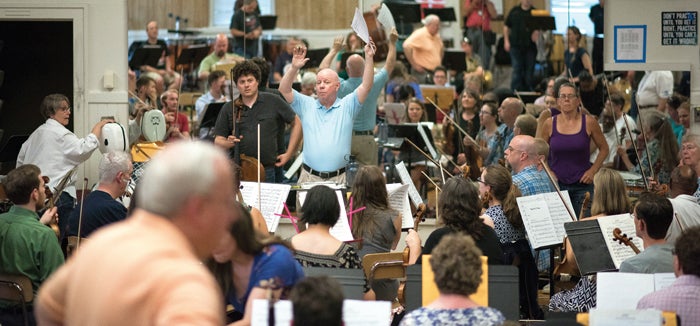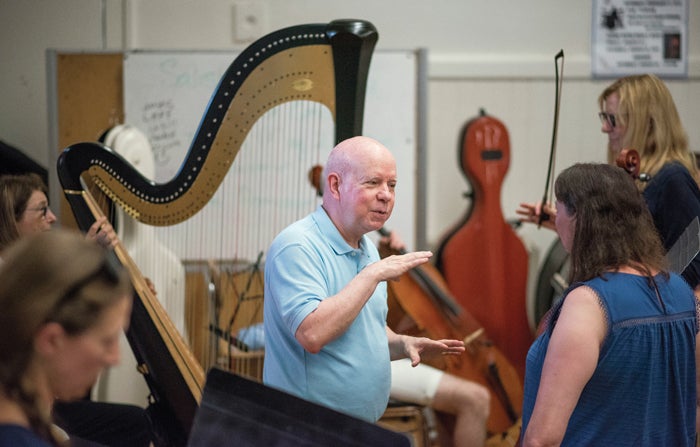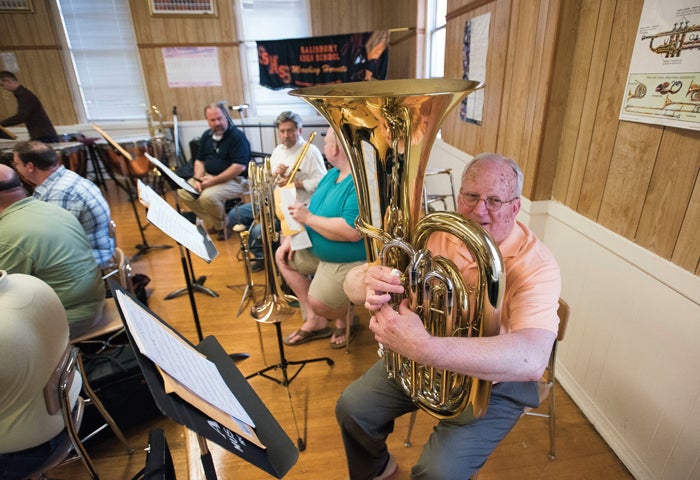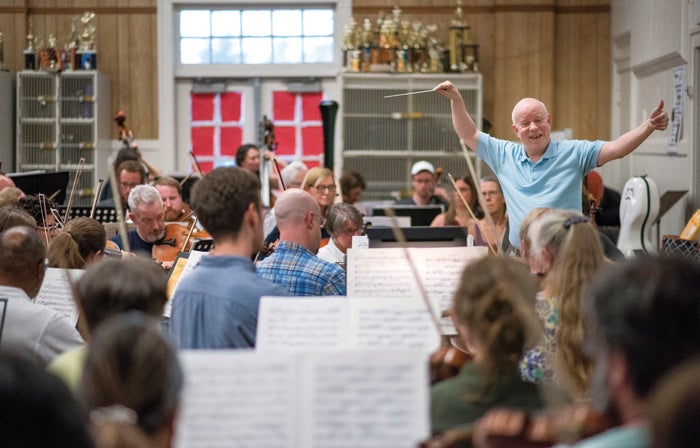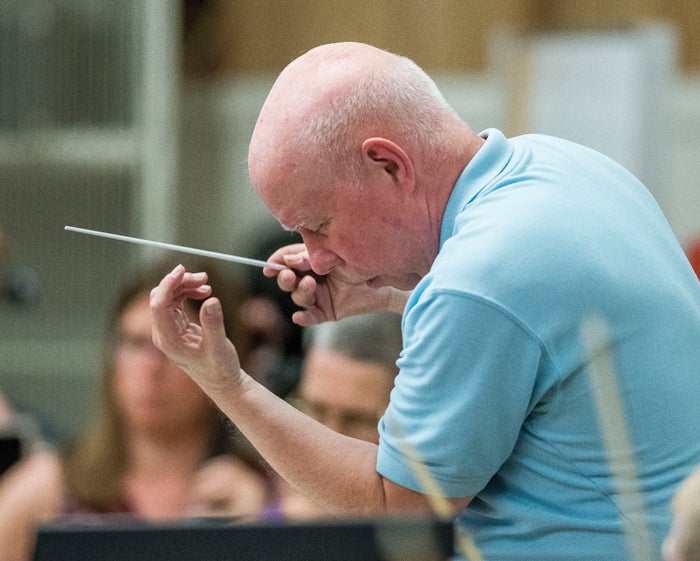A lifetime of music: Maestro found his place at the podium
Published 12:00 am Friday, May 31, 2019
By Maggie Blackwell
For the Salisbury Post
SALISBURY — Despite having earned two master’s degrees and a doctorate from Yale, Salisbury Symphony Orchestra Maestro David Hagy is adamant that the greatest influence on who he is was the Indianapolis public school system.
From the first grade, students studied classical music. In a formal training program, teachers would drop the needle of a phonograph onto an LP and play music for a moment or two. Students were to identify the piece of music and composer.
The first year, students had to identify four pieces of music and their composers. As students moved up through grades, they had to identify more and more compositions. The students trained all year with needle drops, Hagy says, and at the end of the year, the Indianapolis Symphony Orchestra played snippets live. Students in schools across the city listened to the live performance on the radio and wrote down their answers.
“If you got a perfect score,” Hagy said, “you were invited to Cadle Tabernacle, with 10,000 seats, to hear the symphony live. My mother had to take me there to that place to hear the symphony. I think my parents were perplexed by what was going on. They would never have gone there; it wasn’t something they were familiar with.”
Hagy’s mom was a secretary. His dad managed the parts department at the local Dodge dealership.
Hagy learned to play the violin — “because my grandmother had one in her closet” — and, later, the piano. A friend had a big, upright piano in his basement and needed to get rid of it. Hagy, without asking his parents, volunteered to take it off his hands.
His mom was shocked when the piano showed up at their home. Unfortunately, it was too large to make the corner into Hagy’s bedroom. So the friend donated it to the school system.
Hagy’s parents surprised him with a piano that Christmas. He says it is an OK piano; they paid $200 for it. It has one key that’s hard to keep in tune. He still has the piano in his Plaza apartment today.
“That may have been the absolute turning point when they realized this was serious for me,” Hagy says. “I started violin in grade six, clarinet in grade seven and tried to get that piano in eighth grade. Through all this, I’d always wanted to play the piano.”
One thing about David Hagy is his consistency. He lived with both parents in one home until he went to college. They had the same phone number all their lives, and today he has that same number for his mobile phone.
His parents, he says, were always supportive, if a little confused. Hagy’s father bragged on him — in front of him, away from him. His dad would say, “Come play the piano.” And his mom would say, “Do you have to play right now?”
In junior high school, Hagy had a friend who played clarinet. He played violin, which is on a different scale. The two friends worked together to transpose music so they could play together. He wrote original music in seventh and eighth grades.
“Oh, I didn’t know what I was doing,” he says. “I could listen and determine, ‘Oh, that’s bad; oh, that’s good.’”
As Hagy entered high school, the associate director of the Indianapolis Symphony was hired to conduct the all-city orchestra. His name was Thomas Briccetti, and he became Hagy’s first mentor.
“I had many teachers throughout my life, but I only had two real mentors who affected what I would do with the rest of my life,” he says.
Briccetti was one of them. Occasionally, his high school would offer a class in music theory. When Hagy took the class, his band teacher taught it, and Hagy said he molded the class just for Hagy. There were only five or six students in the class, and three of them flunked.
Hagy comped out of first-semester music theory in college at Indiana University and almost the second, thanks to the high school education Indianapolis gave him.
Hagy denies that he’s talented in music. He says he spent his 50s figuring out his gifts and came up with three.
The first, he said, is puzzles. He loves to solve them, and he loves mysteries. Music was a mystery to him as a child, and the school system drove him to figure it out.
His second gift is drama.
“I’m innately dramatic,” he said. “Every bit of my ability to hear pitch was trained by these talented teachers. Baccetti would have me say if that oboe was out of tune, and I had to say if it was flat or sharp. I’d been working with him as a composition student, and he knew what my ear was like. He was trying to hone it. I’m very touched by the level of his commitment to me.”
Finally, Hagy acknowledges he has people skills.
“I think I know how to speak respectfully, speak cajolingly, sincerely. That was probably developed by lots of people, especially my mom, who taught me to treat everyone the same,” Hagy said. “I don’t know where she got that, but she wanted her son to be able to go out there and talk and treat everyone equally — and be treated equally. It may not be innate, but it was so early on, it made an influence.”
Hagy was the manager of the Yale Symphony when he came to Salisbury to interview to be conductor of the local orchestra. It was January 1988, and he was one of four contenders for the job.
“To move for a job that pays no more than $10,000 (at that time) was a little frightening,” Hagy said. “I taught at Catawba, adjunct. I knew I could cobble together some sort of living. In any case, I moved and was able to find work with a group of people who played pretty well. It was kind of exciting.”
Later, he was hired as assistant conductor of the Greensboro Symphony, then conductor of the Greensboro Youth Orchestra. He had done that for four years when the Wake Forest University conductor retired. One of his oboists encouraged him to audition.
Has Hagy mentored others in the way he was mentored? He recalled John Stafford, music director at First Presbyterian Church in Salisbury. Stafford studied under Hagy at Catawba College.
“He definitely has the ear and ability to do conducting and a desire for it to be ‘this way,’” Hagy said. “That’s important for conductors — you have to want it to go a certain way in order to get there. He’s got the definite skills a conductor needs. It was amazing to stumble upon him in my first year teaching at Catawba.”
Rather than mentoring conductors, Hagy sees his legacy more as helping make music a positive experience in the lives of the musicians with whom he’s worked over the years.
In addition to his consistency, one other quality that stands out in Hagy is his devotion to the job. A perfect example is the time he had a heart attack at the podium and kept working. It was in 2016. He was conducting music that he originally thought he would save for his last concert in Salisbury. Suddenly, he realized he couldn’t be as active as he wanted to be.
Hagy usually conducts with big arm movements, but this time, he was able to make only small ones. He experienced pain, but it was general pain, not localized to any one area. He called for a break a little early and asked the manager to get him four aspirin. He then resumed the rehearsal.
After rehearsal was over, Hagy got into his car and headed home. After traveling a block or two, he wondered what might happen if the pain returned at home. So he turned the car around and went to the emergency room, where they confirmed he’d had a minor heart attack.
Hagy now has heart stents.
“I described it to my students, and they were horrified,” he said. “No, no, this is a positive thing. I may be able to survive something at age 74 that I might not have before.”
Violinist Leroy Sellers performed with the symphony from its beginning in 1967.
“He arrived and learned the environment, learned how to negotiate with people,” Sellers said about Hagy. “Once he got established, that orchestra took wings and learned to fly. It’s still growing.”
The musicians love to play for Hagy, Sellers said.
“He is kind. He understands. I’ve never heard him say a mean thing, a derogatory thing, to lower a person’s esteem in that orchestra. Never,” he said. “I’ve heard people say negative things to him, but he never has. I sit back and I watch and listen. This city could never have gotten a finer person.”
Greg Pannell has played violin throughout Hagy’s career here and says Hagy evened out the pay scale and has balanced a highly professional approach with good humor.
“He hears everything. If we stop and there’s something in the brass, for example, he doesn’t say, ‘Let’s hear that again.’ He’s able to say, ‘That note should be X but I think we played a Y.’ It’s a disciplined rehearsal, yet everyone has a good time,” Pannell said.
Hagy is 64 and will retire from Wake Forest in the next few years. He wants to stay on with the Salisbury Symphony Orchestra “as long as I’m healthy, with good hearing, and as long as I’m wanted.”
Hagy will be wanted Saturday at the N.C. Transportation Museum for this year’s Pops at the Post Railway Edition concert.
Tailgaters can start arriving at the museum at 3 p.m., and the symphony is scheduled to play from 7:30 to roughly 9:30 p.m.


